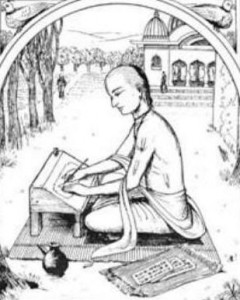1.)The question may be raised that if the living entity has to act as the superintendent of the activities of the bodily combination, then how can he be indifferent to the activities of the body?
2.)The question may be raised here that if everyone engaged in spiritual activities to attain salvation and became indifferent to the activities of the material world, then how could things as they are go on? And if things are to go on as they ought to, how can a head of state be indifferent to such activities
These two very important questions are answered below by Srila Prabhupada, and when we understand those answers and act in such a way, that state of consciousness is called Samadhi.
Hare Krsna
damaghosa das
SB 4.20.11 purport...Lord Kṛṣṇa says in Bhagavad-gītā that the body, made of the gross physical elements (earth, water, fire, air and sky) and the subtle elements (mind, intelligence and ego), is completely different from the soul proper. One should therefore not be disturbed by the action and reaction of these eight gross and subtle material elements. The practical process to attain this stage of indifference is to execute devotional service. Only one who constantly engages in devotional service twenty-four hours a day can be indifferent to the action and reaction of the external body. When a man is absorbed in a particular thought, he does not hear or see any external activities, even though they are enacted in his presence. Similarly, those who are fully absorbed in devotional service do not care what is going on with the external body. That status is called samādhi. One who is actually situated in samādhi is understood to be a first-class yogī.
SB 20.12 purport–The question may be raised that if the living entity has to act as the superintendent of the activities of the bodily combination, then how can he be indifferent to the activities of the body? The answer is given here: these activities are completely different from the activities of the spirit soul of the living entity. A crude example can be given in this connection. A businessman riding in a motorcar sits in the car, supervises its running and advises the driver. He knows how much gasoline is used up, and he knows everything about the car, but still he is apart from the car and is more concerned with his business. Even while riding in the car, he thinks of his business and his office. He has no connection with the car, although he is sitting there. As the businessman is always absorbed in thoughts of his business, so the living entity can be absorbed in thoughts of rendering loving service to the Lord. Then it will be possible to remain separate from the activities of the material body. This position of neutrality can be possible only for a devotee.
The word baddha-sauhṛdāḥ—“bound in friendship”—is particularly used here. Karmīs, jñānīs and yogīs cannot be bound in devotional service. Karmīs fully engage in the activities of the body. Their aim of life is to give comfort to the body only. Jñānīs try to get out of entanglement by philosophical speculation, but they have no standing in the liberated position. Because they do not take shelter under the lotus feet of the Lord, they fall down from the exalted position of Brahman realization. Yogīs also have a bodily concept of life—they think that they can achieve something spiritual by exercising the body through dhāraṇā, āsana, prāṇāyāma, etc. A devotee’s position is always transcendental because of his intimate relationship with the Supreme Personality of Godhead. Therefore, to remain always aloof from the actions and reactions of the body and engage in one’s real occupation, namely rendering service to the Lord, can be possible only for devotees.
SB 4.20.13 purport…Śrīla Viśvanātha Cakravartī Ṭhākura states that one should not care very much whether he is going to be liberated or not, but he should simply execute the direct order received from the spiritual master. If one sticks to the principle of abiding by the order of the spiritual master, he will always remain in a liberated position.
….One can fully remain in intimate connection with the Supreme Lord directly or receive orders from His bona fide representative the spiritual master and execute the orders sincerely when one keeps aloof from the activities of the body.
… One should treat the spiritual master as the Supreme Personality of Godhead and never be envious of him or consider him to be an ordinary human being. If we follow the instruction of the spiritual master and execute devotional service to the Lord, we will remain always free from the contamination of bodily and material activities, and our life will be successful.
SB 4.20 14 purport-The question may be raised here that if everyone engaged in spiritual activities to attain salvation and became indifferent to the activities of the material world, then how could things as they are go on? And if things are to go on as they ought to, how can a head of state be indifferent to such activities? In answer to this question, the word śreyaḥ, auspicious, is used here. The division of activities in society as arranged by the Supreme Personality of Godhead was not blindly or accidently created, as foolish people say. The brāhmaṇa must do his duty properly, and the kṣatriya, the vaiśya and even the śūdra must do the same. And every one of them can achieve the highest perfection of life—liberation from this material bondage. This is confirmed in Bhagavad-gītā (18.45). Sve sve karmaṇy abhirataḥ saṁsiddhiṁ labhate naraḥ: “By executing one’s prescribed duties, one can attain the highest perfection.”
Lord Viṣṇu advised Mahārāja Pṛthu that a king is not enjoined to give up his kingdom and the responsibility of protecting the prajās, or citizens, to instead go away to the Himalayas for liberation. He can attain liberation while executing his royal duties. The royal duty or the duty of the head of state is to see that the prajās, or the general mass of people, are doing their respective duties for spiritual salvation. A secular state does not necessitate a king or head of state who is indifferent to the activities of the prajās. In the modern state the government has many rules and regulations for conducting the duties of the prajās, but the government neglects to see that the citizens advance in spiritual knowledge. If the government is careless in this matter, the citizens will act whimsically, without any sense of God realization or spiritual life, and thus become entangled in sinful activities.
An executive head should not be callous to the welfare of the general mass of people while he simply goes on collecting taxes. The king’s real duty is to see that the citizens gradually become fully Kṛṣṇa conscious. Kṛṣṇa conscious means completely free from all sinful activities. As soon as there is complete eradication of sinful activities in the state, then there will be no more war, pestilence, famine or natural disturbances. This was actually prevailing during the reign of Mahārāja Yudhiṣṭhira. If a king or head of the government is able to induce the citizens to become Kṛṣṇa conscious, then he is worthy to rule over the mass of people; otherwise, he has no right to levy taxes. If the king looks after the spiritual interests of the citizens, he can levy taxes without difficulties. In this way both the subjects and the king will be happy during this life, and in the next life the king will be able to share one sixth of the pious activities of the citizens. Otherwise, by levying taxes on the sinful citizens, he will have to share the reactions of their sinful activities.
This same principle can be applied to parents and spiritual masters as well. If parents simply give birth to children like cats and dogs but cannot save their children from imminent death, they become responsible for the activities of their animalistic children. Lately, such children are turning into hippies. Similarly, if a spiritual master cannot direct his disciples to become free of sinful activities, he becomes responsible for their sinful acts. These subtle laws of nature are unknown to the present leaders of society. Since the leaders of society have a poor fund of knowledge and the citizens in general are rogues and thieves, there cannot be an auspicious situation for human society. At the present moment the whole world is full of such an incompatible combination of state and citizens, and therefore there is constant tension, war and anxiety as an inevitable result of such social conditions.


